Introduction
I recently found myself looking for a simple analytics solution for my personal site and blog. I didn’t need session replays, complex dashboards, or marketing automation - just basic stats that respected my users’ privacy. What I discovered was a growing landscape of open-source analytics tools built by developers like me, for developers like me.
Web analytics don’t have to come at the cost of user privacy. As concerns around surveillance capitalism grow, many developers and site owners are turning to privacy-first alternatives to Google Analytics. These tools promise valuable insights without invasive tracking, cookies, or shady data sharing.
In this article, I compare some of the best privacy-respecting analytics tools. That said, I won’t be covering full-featured platforms like Posthog or Piwik - these aim to be Google Analytics replacements, with advanced features like user session replay, feature flagging or retention cohorts.
Instead, we’ll focus on lightweight tools that do one thing well: give you simple, valuable insights without tracking users across the web.
Why Are There So Many Privacy Analytics Tools?
If it feels like every developer and their cat has built a privacy-first analytics tool, you’re not wrong. The rise of GDPR, growing distrust in Big Tech, and Google Analytics getting blocked by browsers and regulators has opened the floodgates.
A community-maintained GitHub list currently tracks dozens of analytics tools. At the time of me writing this, there are 15 privacy focused analytics tools in this list. While many have overlapping features, the differences in UX, deployment, hosting options, and privacy models set them apart.
For this article, we’ll be comparing the following:
These offer a good mix of popular, well-maintained, and up-and-coming options.
How I'm Comparing Them
Each tool will be evaluated based on the following:
- Script size (minified + gzip)
- UX and dashboard quality
- Ease of setup
- Feature set (events, goals, funnels, etc.)
- Open source license & GitHub activity
- Resource usage (database backend, RAM/disk)
- Scalability for high-traffic use
Script sizes reflect minified + gzipped versions. For libraries without official NPM packages (e.g., Umami, GoatCounter, Offen, Shynet), I downloaded their script.js, minified it with terser using terser script.js -c -m -o min.js then gzipped it via gzip -9 -c min.js | wc -c to get real-world transfer sizes.
Overview Table
Here’s a quick comparison of the tools before we dive into each one:
| Tool | Script Size | Notable Features | License | Database |
|---|---|---|---|---|
| Plausible | 1.1 KB (gzip) | Goals, custom events, fast UI | AGPL-3.0 TL;DR Legal | Clickhouse |
| Umami | 1.5 KB (gzip) | Multi-site, event tracking | MIT TL;DR Legal | MariaDB, MySQL, PostgreSQL |
| GoatCounter | 3.3 KB (gzip) | No JS mode, lightweight dashboard | EUPL-1.2 Modified License | SQLite, PostgreSQL |
| Shynet | <1 KB | Server-side tracking only | Apache-2.0 TL;Dr Legal | SQLite, PostgreSQL |
| Koko | <1 KB | WordPress plugin, privacy by default | GPL-3.0 TL;DR | SQLite, MySQL |
| Offen | 4.6 KB (gzip) | Built-in user consent and data access | Apache-2.0 TL;Dr Legal | SQLite, MariaDB, MySQL, PostgreSQL |
| Ackee | 7.6 KB (gzip) | Real-time stats, API support | MIT TL;DR Legal | MongoDB |
Tool-by-Tool Breakdown
Here’s a short overview of each tool, including what it’s best at, setup quirks, and anything that stands out in terms of performance or privacy stance.
Plausible
Plausible is a lightweight yet feature-rich analytics platform built for developers, marketers, and teams who want privacy without sacrificing insight. It’s powered by ClickHouse, a high-performance columnar database that enables fast queries over large datasets, making it well-suited for high-traffic applications.
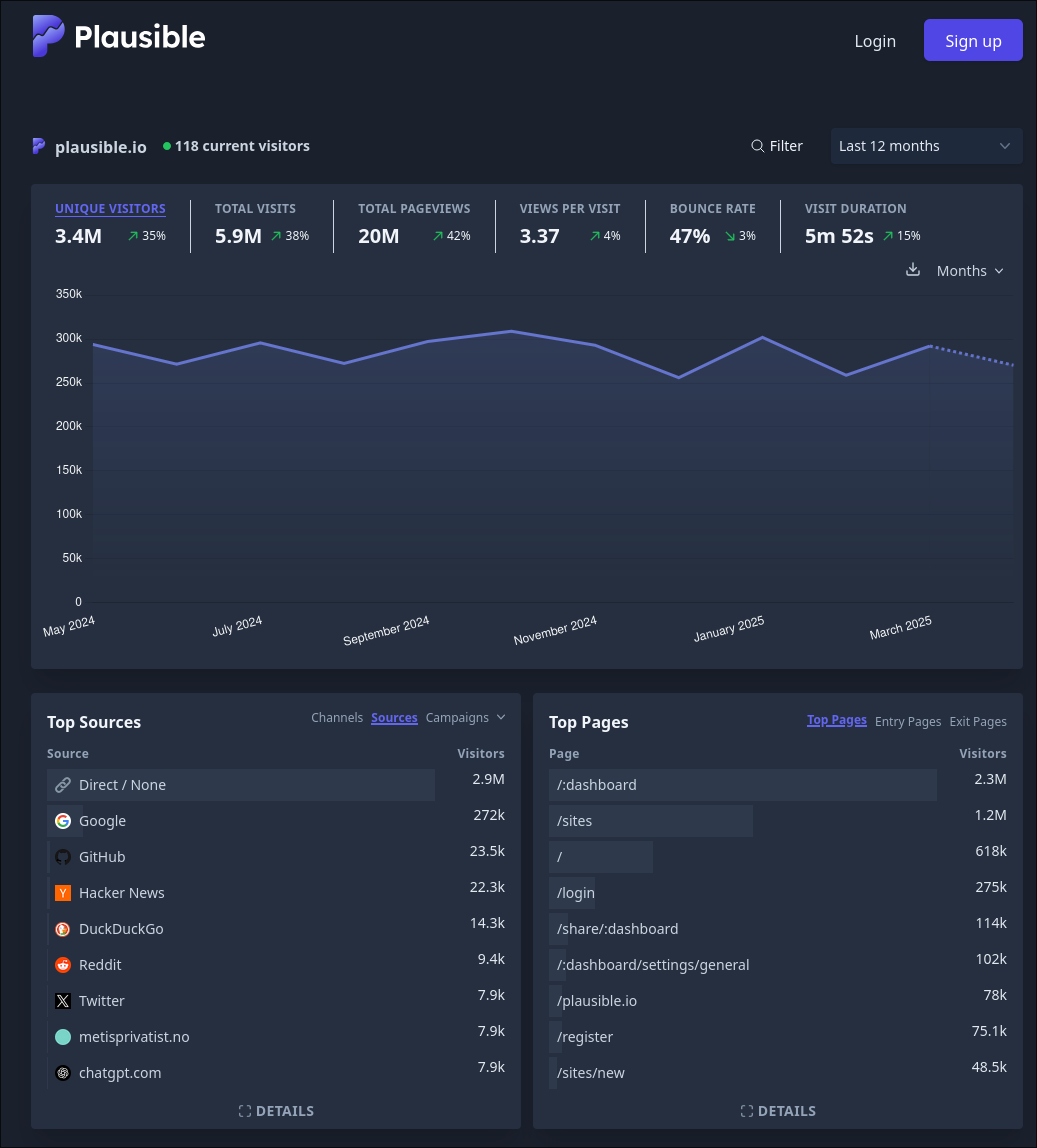
It offers all the essentials: pageviews, unique visitors, bounce rate, traffic sources, and device breakdowns. Beyond that, it supports conversion goals, e-commerce revenue tracking, UTM campaign analysis, and codeless funnel tracking. It even includes real-time dashboards and segmentation, allowing you to slice metrics by referrer, page, or country with one click.
Plausible is entirely GDPR, CCPA, and PECR compliant. It doesn’t use cookies or track personal data, and the tracking script is minimal (1.1 KB gzipped). It also avoids fingerprinting and persistent identifiers.
Self-hosting Plausible requires Docker and a ClickHouse backend, which makes it slightly more complex to run than simpler PostgreSQL-based tools. However, its scalability offsets this complexity - it handles hundreds of millions of events efficiently. Plausible is hard to beat if you’re building a serious product or SaaS and want fast, beautiful, and privacy-conscious analytics with a mature feature set.
Umami
Umami strikes a sweet balance between ease of use and power. It’s lighter than Plausible and runs on a more accessible PostgreSQL backend. The dashboard is clean and fast, with real-time updates and all the core metrics you’d expect - pageviews, traffic sources, devices, bounce rates, and more.
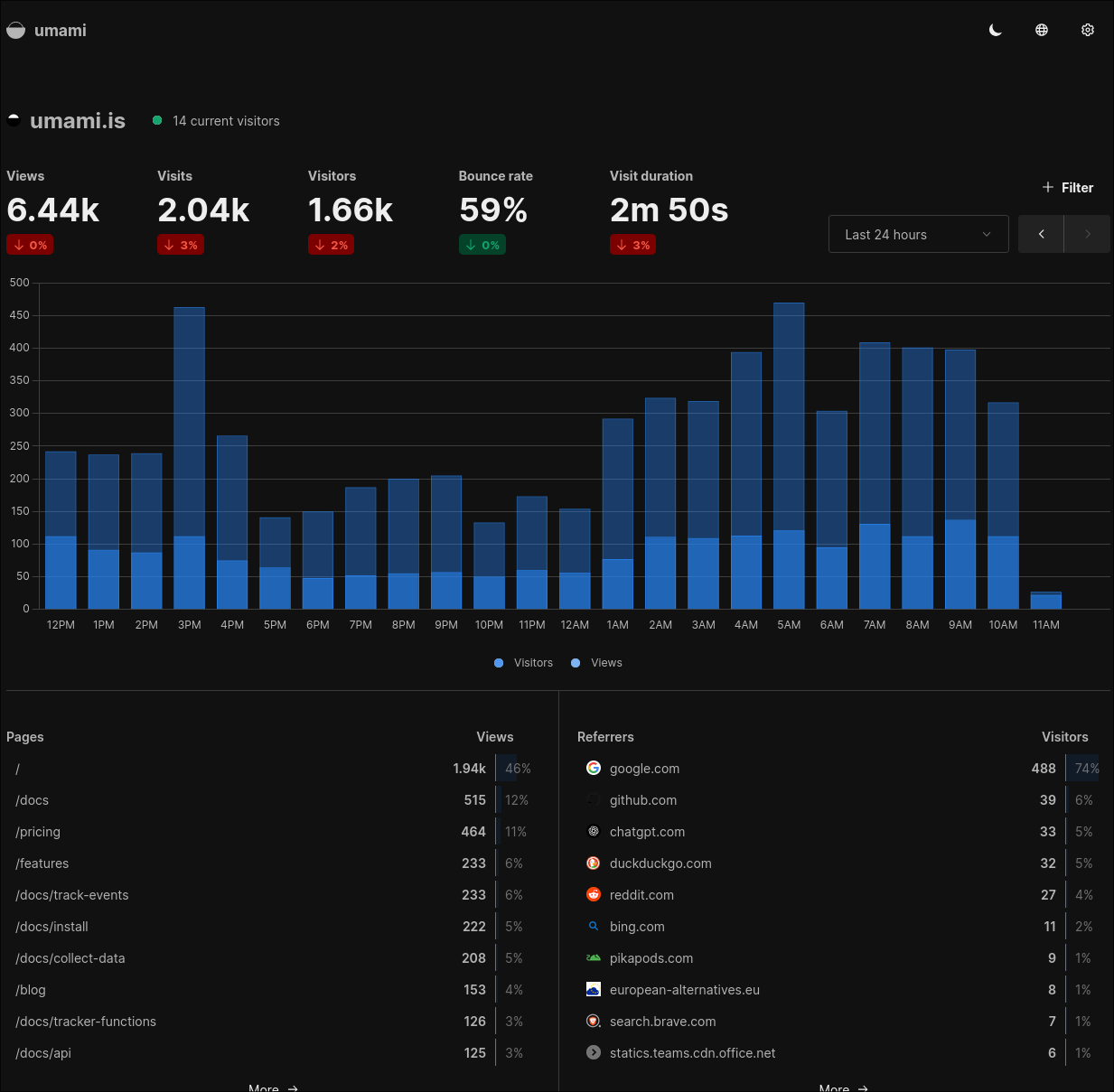
Umami supports multiple websites under one dashboard, custom events, UTM campaign tracking, and shareable links with public or restricted access. It also includes funnels, team permissions, retention metrics, and simple reporting tools. Real-time updates are built in, and the dashboard is responsive and mobile-friendly.
One of Umami’s most attractive qualities is its straightforward, focused interface. It avoids overwhelming you with data and instead makes standard metrics - like pageviews, referrers, locations, and devices - easy to interpret. If you need to track multiple projects or want to share stats with clients or collaborators, Umami handles it well.
The tracker script is lightweight (1.5 KB gzipped) and doesn’t rely on cookies or fingerprinting. Umami is a great choice for developers looking for a general-purpose analytics tool that balances privacy, ease of use, and customizability.
GoatCounter
GoatCounter is a minimalist, no-frills analytics platform built in Go. It’s ideal for personal blogs, indie projects, and small websites that don’t want to deal with cookie consent, large JS bundles, or complex dashboards.
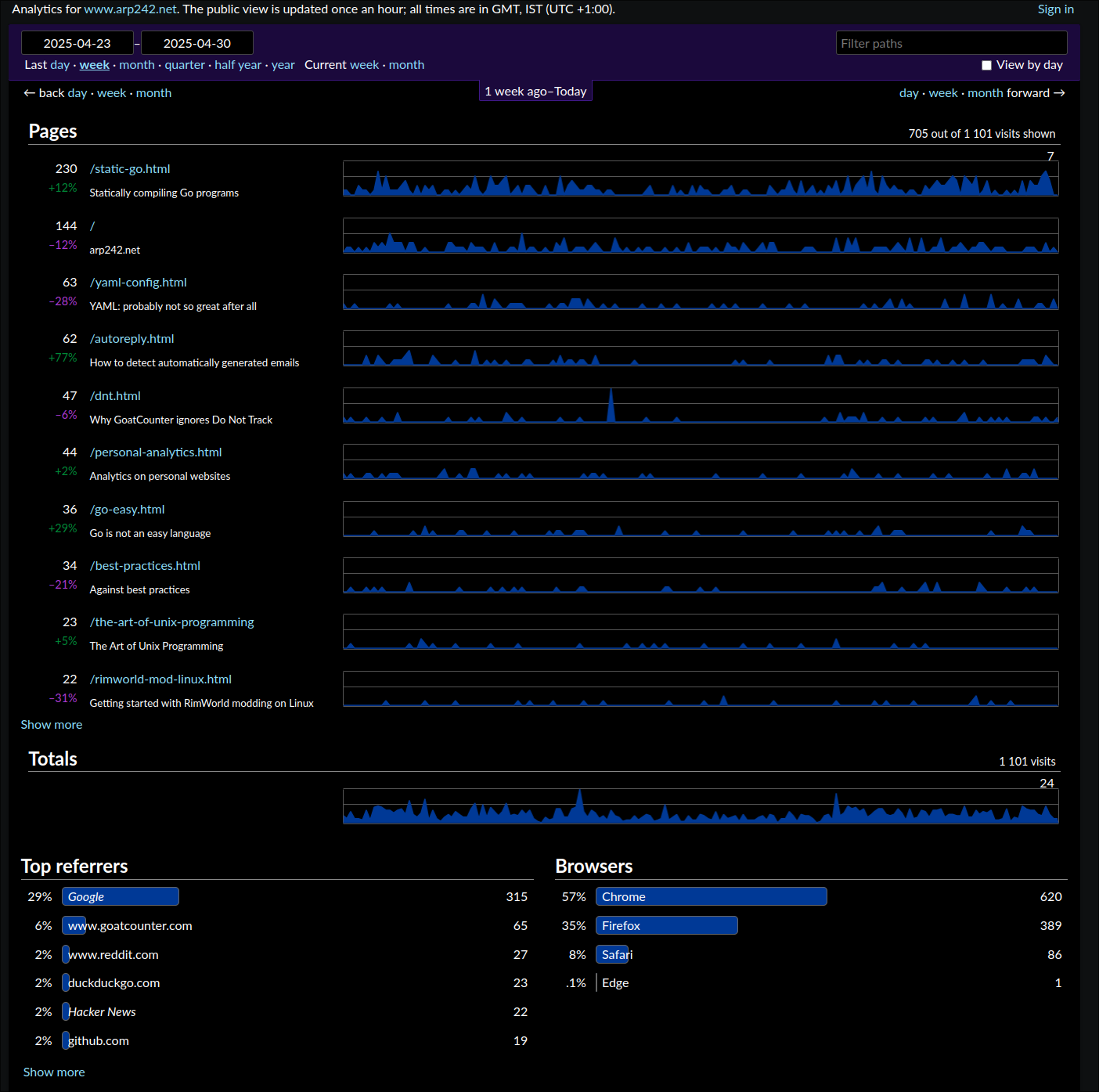
ts focus is on privacy and speed. GoatCounter tracks essential metrics: page views, referrers, locations, screen sizes, and user agents. It doesn’t collect personal data and can operate without JavaScript via a 1x1 tracking pixel. The tracker script is just 3.3 KB (gzipped).
The UI is intentionally simple - accessible via keyboard, screen-reader friendly, and devoid of visual clutter. This makes it easy to use but not overwhelming, even for non-technical users. There’s also a “text mode” view for those who prefer CLI-like summaries.
The setup is straightforward, thanks to its self-contained Go binary. You can deploy it on a small VPS, behind a reverse proxy, or in Docker. It uses SQLite by default, which is perfect for most low- to medium-traffic websites.
GoatCounter doesn’t offer advanced segmentation, goal tracking, or event support. But if you’re building a static site or want fast, privacy-first stats without the overhead of traditional analytics tools, it’s one of the most elegant options available.
Shynet
Shynet is for the builders who like to peek under the hood. It’s a Django-based tool you can run with or without JavaScript (it falls back to a tracking pixel). It doesn’t show off with animations or modern flair, but it gets the job done with clarity.
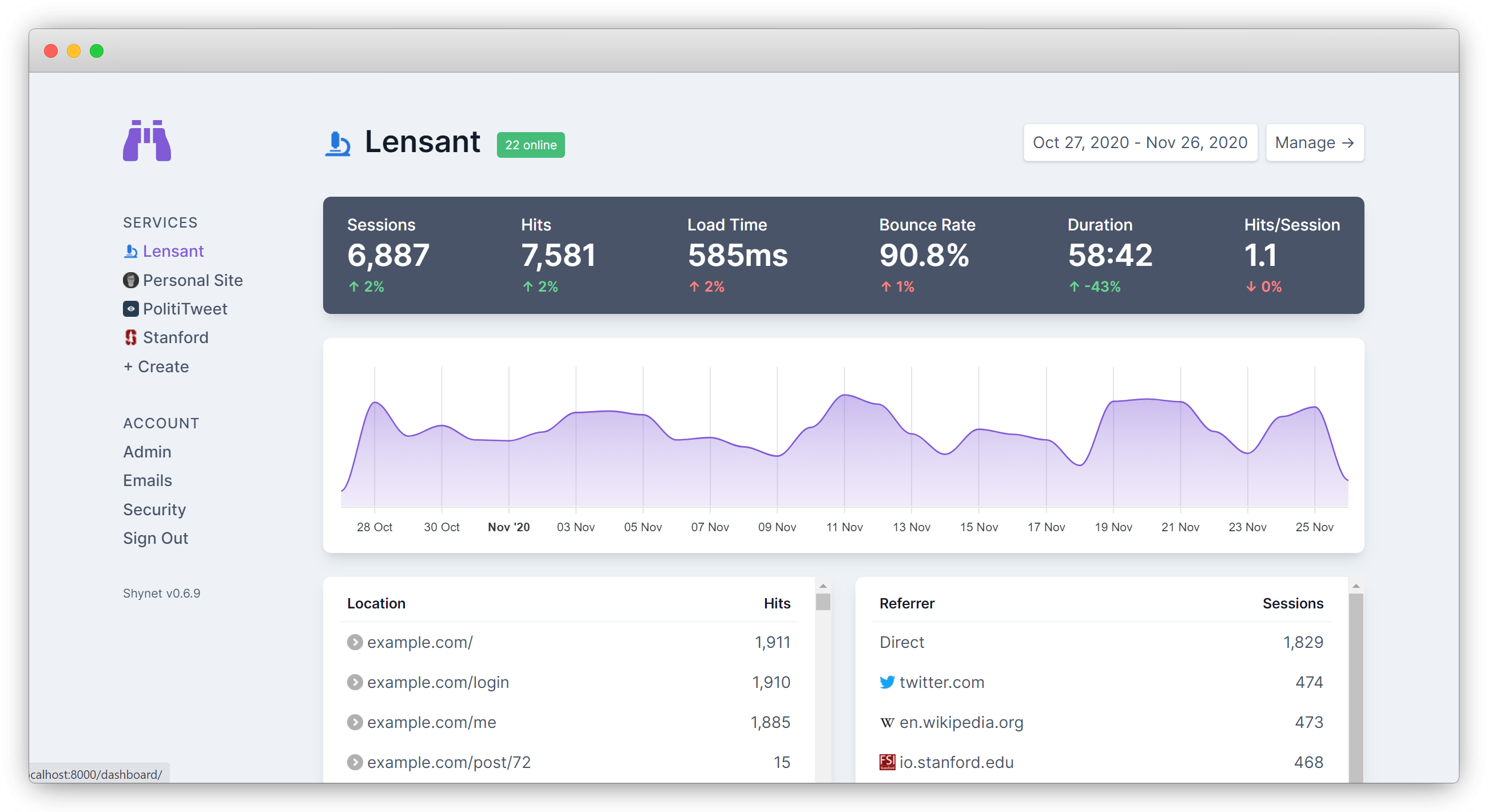
It’s collaborative, too - you can add multiple users and track various services. The setup can be a bit more involved, especially if you’re deploying to Heroku or Kubernetes, but if you’re a dev, you’ll feel right at home.
It’s under 1 KB and rarely blocked by ad blockers since it runs on your own domain. Shynet is a solid and private alternative for technically inclined users looking for control.
Koko Analytics
Koko is designed specifically for WordPress and integrates natively as a plugin, meaning no third-party platforms or complex server setup is needed. Once installed, it starts tracking views, unique visitors, and referral sources without requiring external APIs or cookie banners.
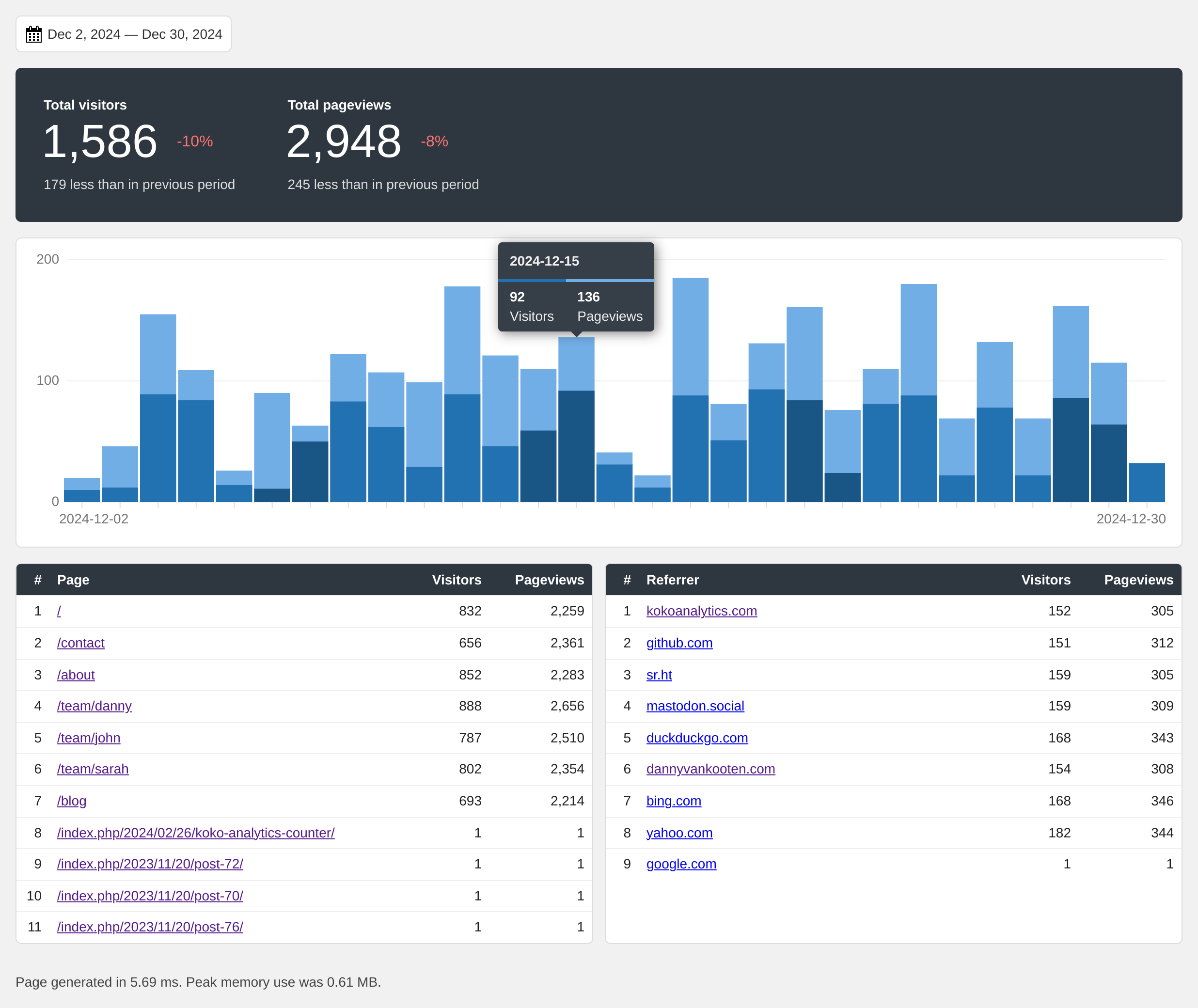
Its data is stored locally using a custom SQLite schema, which ensures privacy and fast access. The tracking script is tiny (<1 KB) and designed to be cache-compatible, which is a big plus for SEO-focused blogs and sites served from CDNs or cached environments.
While Koko doesn’t provide advanced features like funnels, custom events, or deep segmentation, it excels at doing the basics right: fast, lightweight, private pageview tracking. It’s the top pick if you’re running a WordPress blog or simple content site and want GDPR-friendly analytics with zero setup overhead.
Offen
Offen takes privacy to a philosophical level by flipping the analytics model: users must opt into the tracking, and they’re given full access to their personal data via the “Auditorium” interface. This makes Offen one of the few analytics platforms that’s truly user-consensual by design.
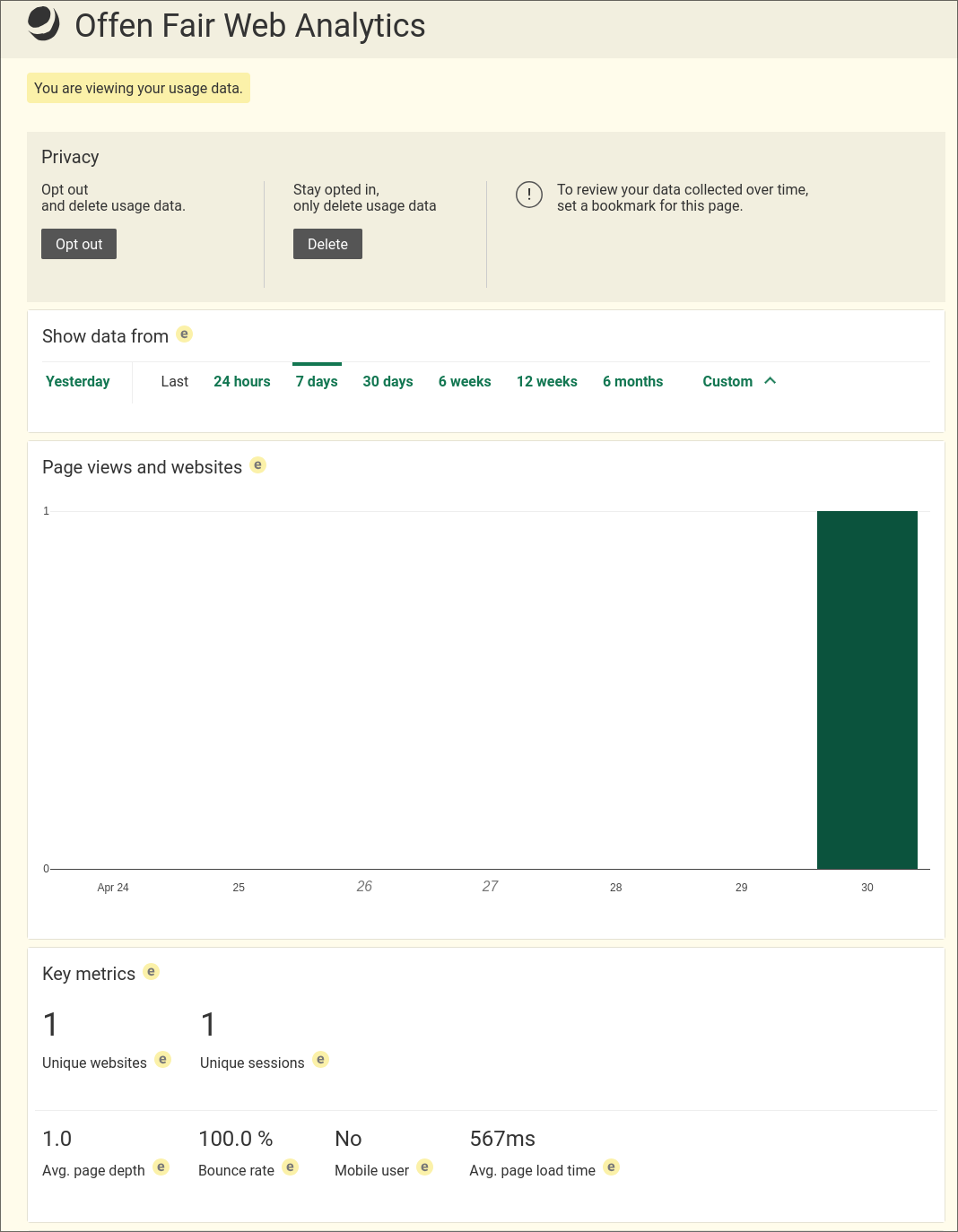
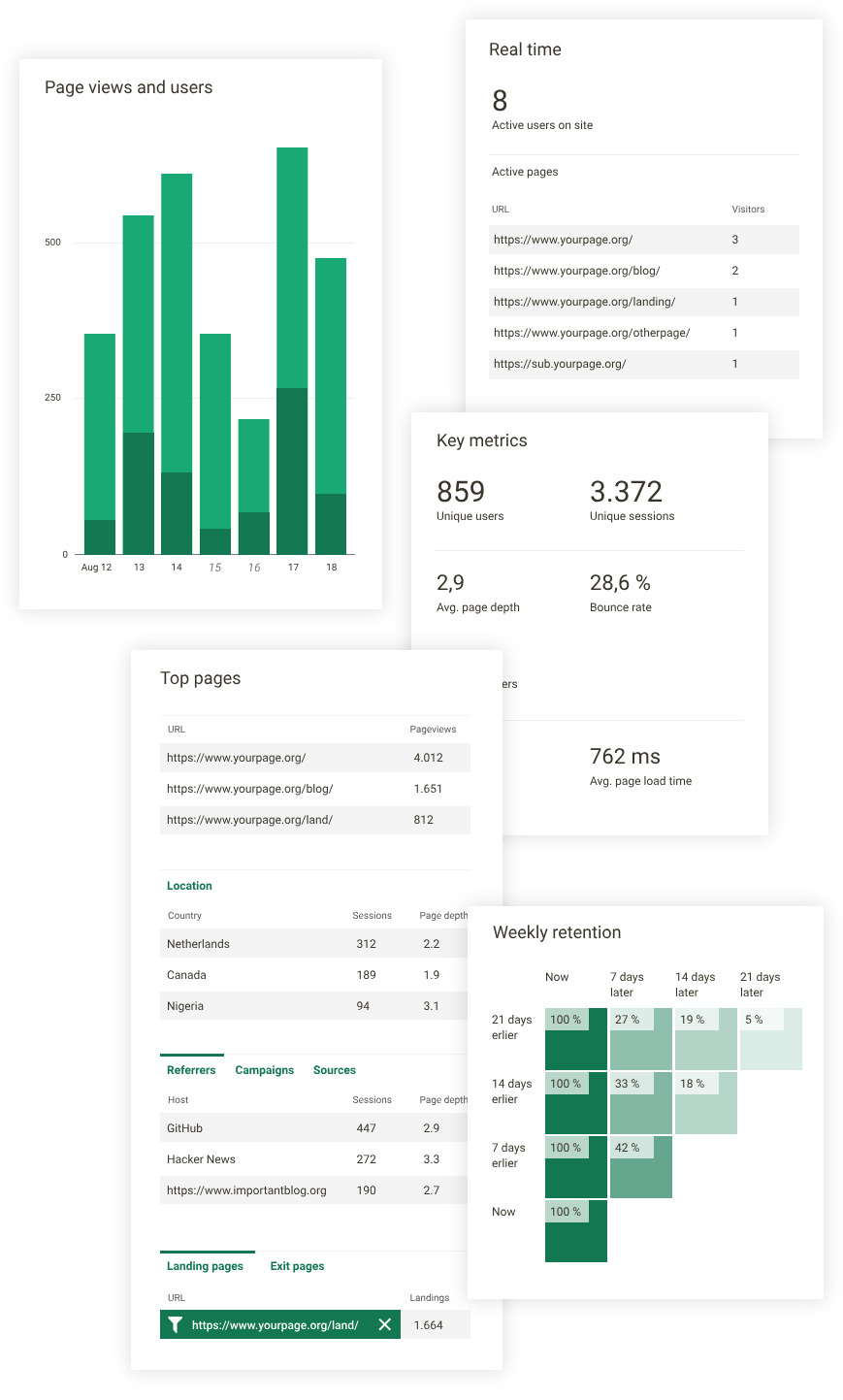
From a technical standpoint, Offen uses SQLite, is deployable via Docker, and includes real-time dashboards, UTM tracking, and retention metrics. It supports multi-site monitoring and lets you filter results by location, landing/exit pages, and referrer paths. Users’ data is encrypted end-to-end and automatically deleted after 6 months.
The trade-off? Offen’s opt-in nature means you won’t get 100% coverage unless users agree. But if transparency and ethical data use are core values of your product or organization, Offen makes a strong case — both technically and ideologically.
Ackee
Ackee is a self-hosted Node.js-based analytics platform with a strong emphasis on customization and developer tooling. It stores data in MongoDB and exposes a powerful GraphQL API, making it one of the most extensible tools in this list.
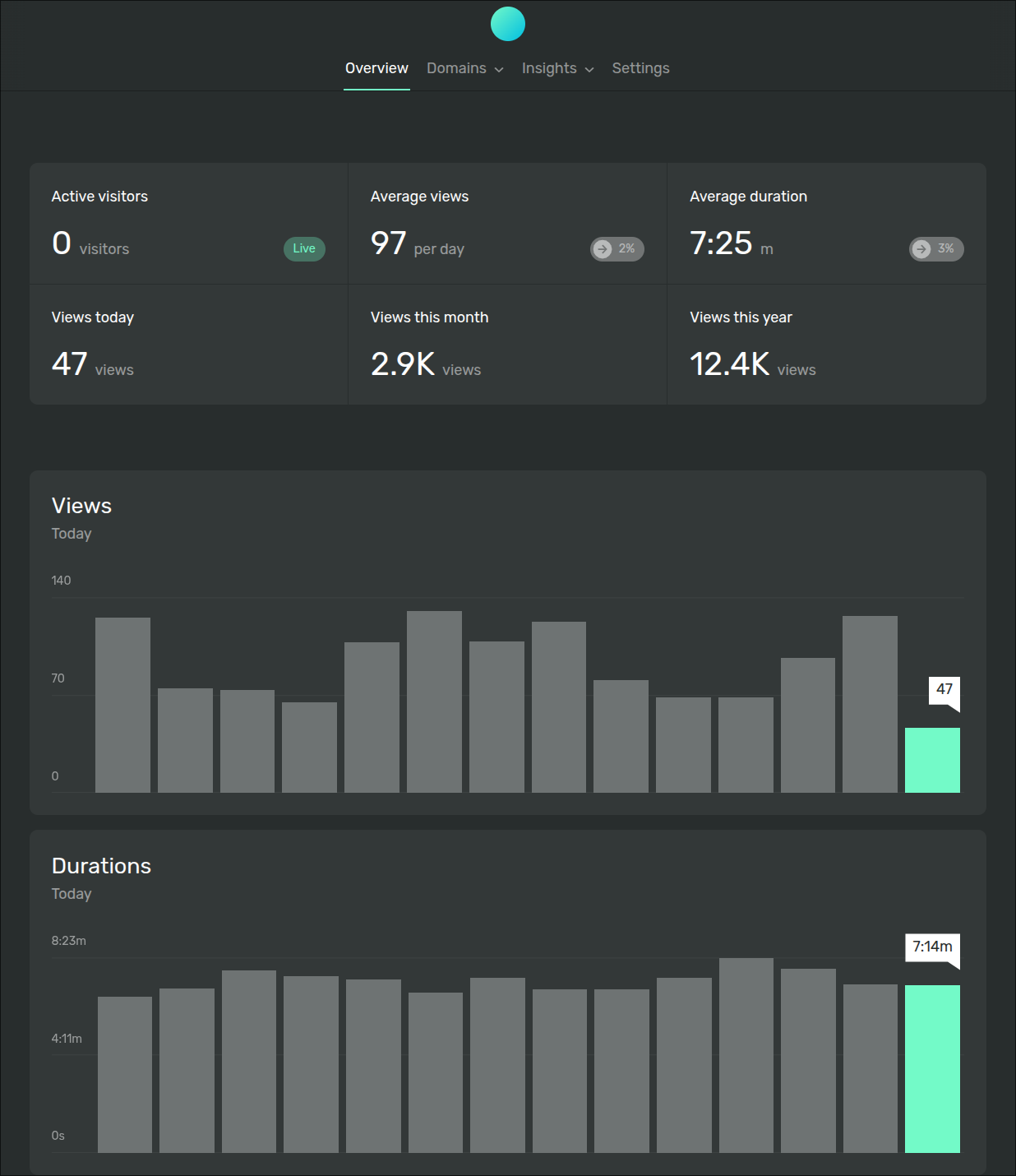
Its UI is modern and clean, designed to prioritize readability and responsiveness. Ackee tracks views, durations, referrers, screen dimensions, and more. Unlike others, it doesn’t provide goals or funnels out of the box, but developers can build those features themselves via the API.
The tracker script is 7.6 KB (gzip), and setup requires a Docker or a Node.js + MongoDB environment. While it’s not as plug-and-play as something like Umami or GoatCounter, it shines when integrated into custom dashboards, admin panels, or data pipelines.
Ackee is a solid choice for developers who want complete control and don’t mind doing a bit of wiring.
Final Thoughts
All of these tools are strong choices, and which one you pick really depends on your goals, infrastructure, and personal preferences. If you want the most polished and scalable option and don’t mind the heavier setup, Plausible is hard to beat. If you value simplicity and want something you can self-host with less overhead, Umami or GoatCounter might be more your speed.
For WordPress users, Koko is a perfect plug-and-play option. If you’re building a privacy-first platform where users have a say, Offen makes a powerful ethical statement. And for devs who love complete control and a minimal UI, Ackee and Shynet offer two different but excellent flavors.
None of these tools are trying to be a complete replacement for Google Analytics or PostHog - that’s the point. They’re clean, privacy-respecting, and fast. That alone makes them worth considering.
After trying several of these tools locally, I ended up choosing Umami for my blog. It offered the best balance of ease of use, privacy features, and extensibility for my needs. I liked that it runs on PostgreSQL (which I was already using), and the dashboard gave me just the right amount of information without clutter. Plus, the real-time stats and shareable public links were nice touches.
Resources & Further Links
- Fathom’s open source discussion – Podcast
- Bundlephobia – Analyze NPM package size
- TLDRLegal – License summaries
- Awesome Analytics Github Repo
Thanks for reading. If you’ve used one of these tools (or something not listed), I’d love to hear about it!
Note: All information is accurate as of April 2025, but open source projects evolve quickly. Always check the project’s GitHub for the latest updates.
